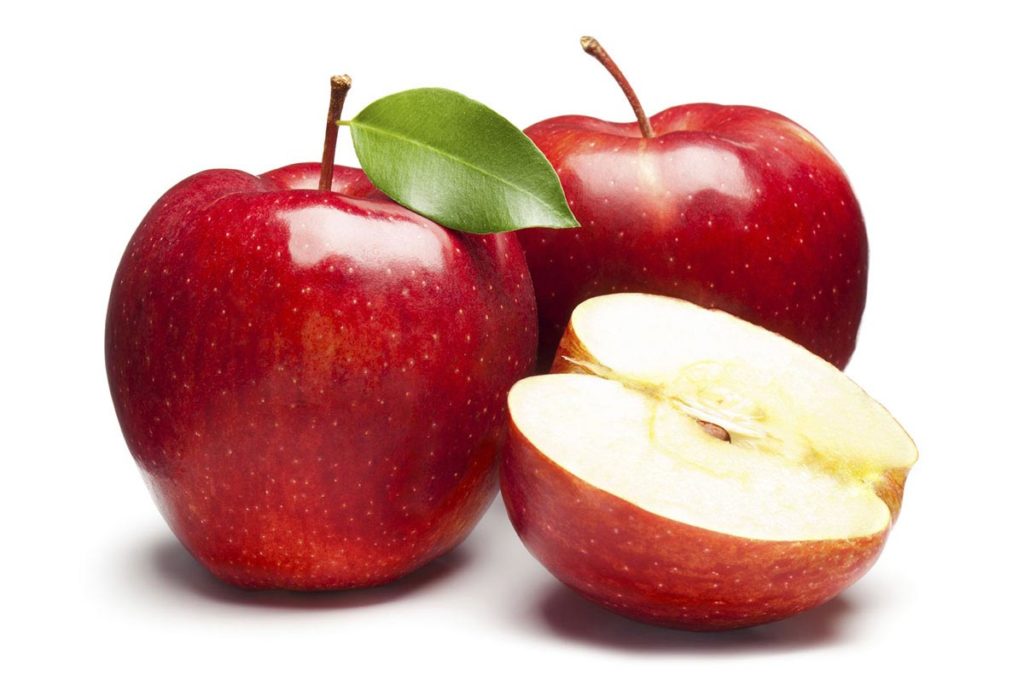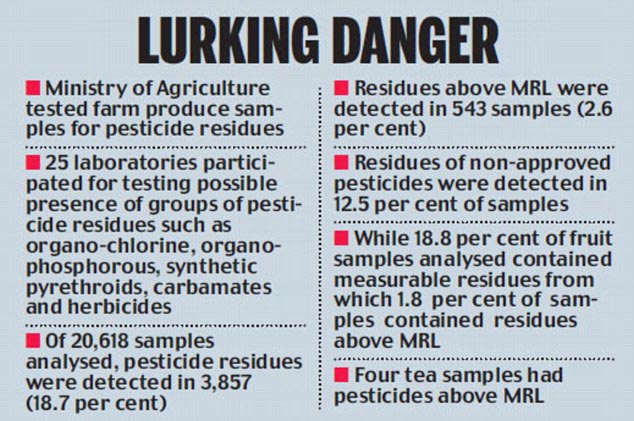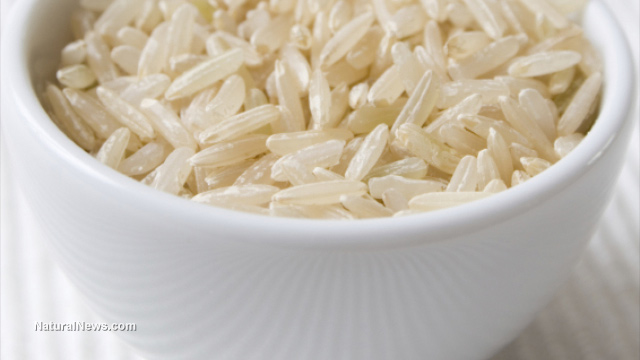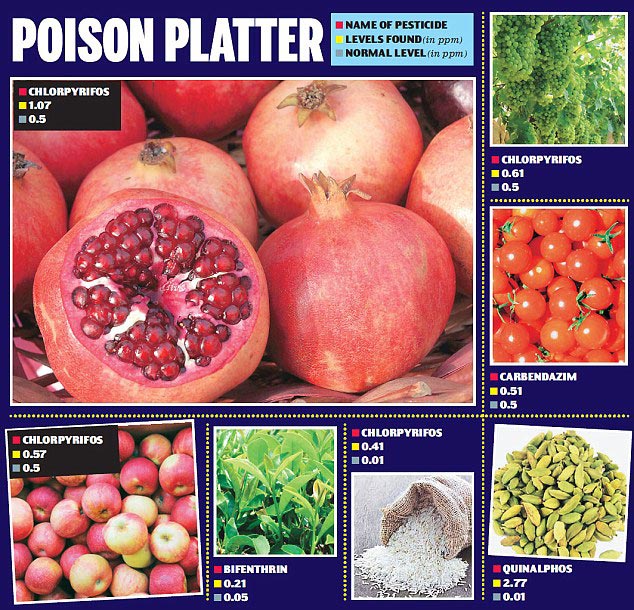Organic food products that you buy from retail outlets may be laced with banned pesticides. Even fresh fruits and vegetables may have residues of hazardous pest-killers in them.
A report released by the Ministry of Agriculture has found traces of pesticides in samples collected from various outlets across India.
The ministry checked pesticide residues in samples of vegetables, fruits, spices, red chilli powder, curry leaves, rice, wheat, pulses, tea and milk.
Officials collected samples from various retail outlets, farms and organic outlets located in different parts of the country, and tested them in 25 participating laboratories for groups of pesticide residues such as organo-chlorine, organo-phosphorous, synthetic pyrethroids, carbamates and herbicides.
A total of 20,618 samples were tested and pesticide residues detected in 18.7 per cent of them.
Chemical contamination above the Maximum Residue Limits (MRL) was detected in 2.6 per cent of samples, as prescribed by the Food Safety and Standards Authority of India (FSSAI).
The lab results found that 12.5 per cent of samples also had residue of non-approved pesticides.
Over 8K samples
Ministry officials collected over 8,342 vegetable samples from various retail markets. Samples of brinjal, okra, tomato, cabbage, cauliflower, green chilli, capsicum, cucumber, green pea, bitter gourd and coriander leaves were subjected to tests, and in 2.7 per cent samples pesticide residues were found exceeding the MRL.
Interestingly, 3.7 per cent of farm-gate samples and 2 per cent of organic outlet samples were found to be laced with pesticide residues exceeding the MRL.
Similarly, out of 2,239 samples of apple, banana, pear, grapes, orange, pomegranate, guava, and mango, 18.8 per cent contained measurable residues. Also, 1.8 per cent of samples had residues above the FSSAI-prescribed MRL.
“Residues in samples of grapes, pomegranate and apple were commonly found above MRL. There was presence of chlorpyrifos, imidacloprid, cyhalothrin-l, buprofezin, metalaxyl and difenoconazole. As many as 225 fruit samples were detected with the residues of non-approved pesticides such as cephate, acetamiprid, carbosulfan, cypermethrin, profenofos, quinalphos and metalaxyl,” the report said.
Out of 805 wheat samples, 17 were found to be carrying residues of deltamethrin pesticides above MRL. At least 6.01 per cent of samples of pulses were found with non-approved pesticide residues.
Out of 1,076 rice samples, 68 were found to have pesticides above MRL.
“A total number of 1,299 spice samples comprising coriander, cardamom, fennel, black pepper, cumin, curry leaves and red chilli powder were collected and analysed, of which 107 samples contained residues above MRL. The pulse samples (715) were collected and analysed and only one showed residues above MRL. In four tea samples, out of 174 collected and analysed, there were residues above MRL,” the report said.
After the report has found concerning levels of pesticide residues, the ministry has started awareness programmes for farmers.
“We propagate judicious use of pesticides. It is very important to raise the education level of farmers so that they understand the hazards of excessive usage of pesticides on environment and humans. In organic produce, there should be no pesticides because these products are sold under the label of ‘organic food’,” said Dr KK Sharma, Project Coordinating Cell, Indian Agricultural Research Institute (IARI), Ministry of Agriculture & Farmers Welfare.
“The pesticide residue levels are still in control in India as compared to some other countries. But there is a need for monitoring the use of pesticides and increasing awareness among farmers,” he added.
Organophosphates and carbamates can affect the nervous system. Others may irritate the skin or eyes. Some pesticides may be carcinogens. Others may affect hormones or endocrine system in the body.
 Free of chemicals and artificial preservatives, Virgin Coconut Oil comes with amazing medicinal properties. This exquisite oil is extracted by using ancient cold-pressed technology. As no heating procedure is carried out, all nutrient contents are intact. Low calories Virgin coconut oil has a natural taste and aroma.
Free of chemicals and artificial preservatives, Virgin Coconut Oil comes with amazing medicinal properties. This exquisite oil is extracted by using ancient cold-pressed technology. As no heating procedure is carried out, all nutrient contents are intact. Low calories Virgin coconut oil has a natural taste and aroma. see how it works
see how it works












